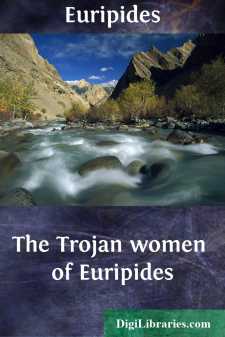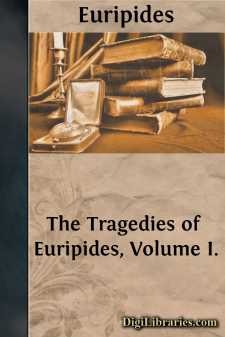Categories
- Antiques & Collectibles 13
- Architecture 36
- Art 48
- Bibles 22
- Biography & Autobiography 813
- Body, Mind & Spirit 142
- Business & Economics 28
- Children's Books 15
- Children's Fiction 12
- Computers 4
- Cooking 94
- Crafts & Hobbies 4
- Drama 346
- Education 46
- Family & Relationships 57
- Fiction 11829
- Games 19
- Gardening 17
- Health & Fitness 34
- History 1377
- House & Home 1
- Humor 147
- Juvenile Fiction 1873
- Juvenile Nonfiction 202
- Language Arts & Disciplines 88
- Law 16
- Literary Collections 686
- Literary Criticism 179
- Mathematics 13
- Medical 41
- Music 40
- Nature 179
- Non-Classifiable 1768
- Performing Arts 7
- Periodicals 1453
- Philosophy 64
- Photography 2
- Poetry 896
- Political Science 203
- Psychology 42
- Reference 154
- Religion 513
- Science 126
- Self-Help 84
- Social Science 81
- Sports & Recreation 34
- Study Aids 3
- Technology & Engineering 59
- Transportation 23
- Travel 463
- True Crime 29
The Trojan women of Euripides
by: Euripides
Categories:
Description:
Excerpt
THE TROJAN WOMEN
In his clear preface, Gilbert Murray says with truth that The Trojan Women, valued by the usage of the stage, is not a perfect play. "It is only the crying of one of the great wrongs of the world wrought into music." Yet it is one of the greater dramas of the elder world. In one situation, with little movement, with few figures, it flashes out a great dramatic lesson, the infinite pathos of a successful wrong. It has in it the very soul of the tragic. It even goes beyond the limited tragic, and hints that beyond the defeat may come a greater glory than will be the fortune of the victors. And thus through its pity and terror it purifies our souls to thoughts of peace.
Great art has no limits of locality or time. Its tidings are timeless, and its messages are universal. The Trojan Women was first performed in 415 B.C., from a story of the siege of Troy which even then was ancient history. But the pathos of it is as modern to us as it was to the Athenians. The terrors of war have not changed in three thousand years. Euripides had that to say of war which we have to say of it to-day, and had learned that which we are even now learning, that when most triumphant it brings as much wretchedness to the victors as to the vanquished. In this play the great conquest "seems to be a great joy and is in truth a great misery." The tragedy of war has in no essential altered. The god Poseidon mourns over Troy as he might over the cities of to-day, when he cries:
"How are ye blind,
Ye treaders down of cities, ye that cast
Temples to desolation, and lay waste
Tombs, the untrodden sanctuaries where lie
The ancient dead; yourselves so soon to die!"
To the cities of this present day might the prophetess Cassandra speak her message:
"Would ye be wise, ye Cities, fly from war!
Yet if war come, there is a crown in death
For her that striveth well and perisheth
Unstained: to die in evil were the stain!"
A throb of human sympathy as if with one of our sisters of to-day comes to us at the end, when the city is destroyed and its queen would throw herself, living, into its flames. To be of the action of this play the imagination needs not to travel back over three thousand years of history. It can simply leap a thousand leagues of ocean.
If ever wars are to be ended, the imagination of man must end them. To the common mind, in spite of all its horrors, there is still something glorious in war. Preachers have preached against it in vain; economists have argued against its wastefulness in vain. The imagination of a great poet alone can finally show to the imagination of the world that even the glories of war are an empty delusion. Euripides shows us, as the centre of his drama, women battered and broken by inconceivable tortureвÐâthe widowed Hecuba, Andromache with her child dashed to death, Cassandra ravished and made madвÐâyet does he show that theirs are the unconquered and unconquerable spirits. The victorious men, flushed with pride, have remorse and mockery dealt out to them by those they fought for, and go forth to unpitied death....







